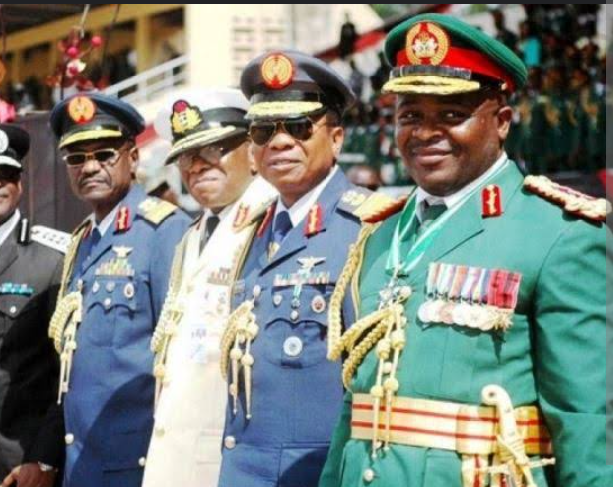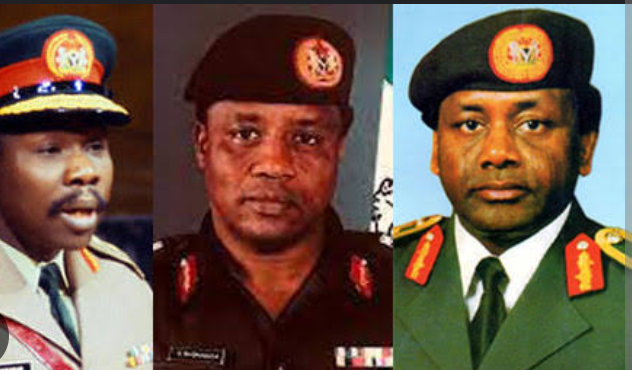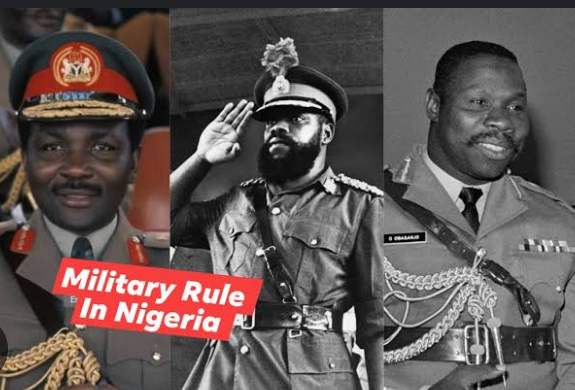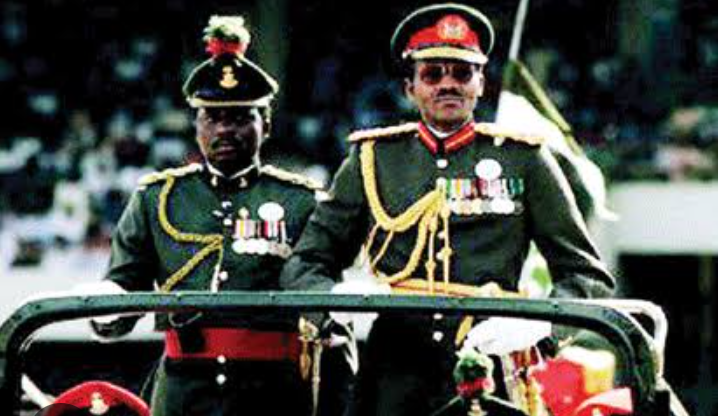The history of military administration in Nigeria is marked by intermittent periods of military rule, which significantly shaped the nation’s political, social, and constitutional development. Military administration has played a pivotal role in Nigerian history, with coups and regime changes leaving lasting imprints on the country’s governance structures.

Historical Overview Military Administration
First Military Regime (1966-1979):1966 Coups:The first military regime began with the January and July coups in 1966, leading to the overthrow of civilian governments. Major Chukwuma Nzeogwu orchestrated the first coup, which was followed by a series of power struggles culminating in General Yakubu Gowon’s emergence.
Biafran Civil War: The Gowon regime oversaw Nigeria’s response to the secessionist Biafran Civil War (1967-1970), shaping the military’s role in national unity.

Oil Boom: The oil boom in the 1970s fueled economic growth but also contributed to corruption and mismanagement during military rule.
Transition to Civilian Rule: In 1979, Olusegun Obasanjo handed over power to a civilian government, marking the end of the first military regime.
Second Military Regime (1983-1999)
Return of Military Rule: General Muhammadu Buhari’s coup in 1983 ushered in the second military regime, characterized by strict governance and an anti-corruption crusade.
Babangida’s Rule: General Ibrahim Babangida took power in 1985, introducing economic reforms but also facing criticism for annulled elections and prolonged military rule.
Failed Transitions: The early 1990s witnessed unsuccessful attempts at transitioning to civilian rule, prolonging military rule and fueling public discontent.

June 12 Crisis: The annulment of the June 12, 1993, presidential election and the subsequent political crisis further eroded the legitimacy of the military government.
Abacha’s Rule: General Sani Abacha’s regime (1993-1998) was marked by human rights abuses, political repression, and international isolation.
Transition to Democracy
Democracy was restored in 1999 following Abacha’s death, with General Abdulsalami Abubakar overseeing the transition to civilian rule.
Impact and Legacy: Constitutional Changes: Military regimes often suspended or amended constitutions, with military decrees taking precedence over civilian laws. These changes aimed to consolidate power within the military.
Economic Impact: Economic policies during military rule contributed to both growth and challenges. The oil boom brought wealth but also corruption, economic mismanagement, and inequality.
Political Instability: Frequent coups and regime changes created a cycle of political instability. And impacted governance structures and hindering the development of stable democratic institutions.
Human Rights Abuses: Military regimes were marked by human rights abuses, including censorship, detention of political opponents, and suppression of dissent.

Legacy of Corruption: Corruption became entrenched during military rule, influencing subsequent governance challenges and efforts to combat corruption in Nigeria.
Transition to Democracy: The return to civilian rule in 1999 marked a turning point. However, the legacies of military rule has continued to influence Nigerian politics. It has contributed to challenges such as corruption, ethnic tensions, and struggles for political power.
The military administrations in Nigeria have significantly influenced the country’s constitutional development. Historical periods of military rule have often seen the suspension of civilian constitutions. And it led to the creation of military decrees that governed the nation.
IMPACTS OF MILITARY ADMINISTRATION ON NIGERIA’S CONSTITUTION
These military regimes left a lasting impact on the constitutional landscape in several ways:
1. Constitutional Suspensions: Military coups in Nigeria often resulted in the suspension of civilian constitutions. The military regimes typically replaced existing constitutional frameworks with military decrees, concentrating power within the armed forces.
2. Authoritarian Rule: Military administrations were characterized by authoritarian rule, limiting civil liberties and democratic processes. The military leaders exercised broad powers without the checks and balances inherent in civilian constitutional governance.
3. Centralized Authority: Military governments tended to centralize authority, diminishing the autonomy of regional and state governments. This centralization influenced constitutional provisions related to federalism and the distribution of powers.
4. Legal Frameworks: Military decrees became the primary legal frameworks during military rule, superseding civilian laws and constitutions. These decrees often aimed to maintain control, suppress dissent, and reinforce military authority.
5. Amendments and Abrogation:
Military administrations frequently amended or abrogated existing constitutions to align them with their governance priorities. These changes were often swift and tailored to suit the interests of the ruling military leadership.
6. Shifts in Constitutional Ideals: Military rule led to shifts in constitutional ideals. Additionally, it focused on maintaining stability and order rather than fostering democratic principles. These shifts had lasting repercussions on subsequent attempts to establish democratic governance.
7. Legacy of Instability: The cycle of military coups and interventions contributed to a legacy of political instability in Nigeria. This instability, rooted in constitutional interruptions, has influenced the nation’s political landscape.
In conclusion, the impact of military administrations on constitutional development is evident in the challenges faced by subsequent democratic governments. Rebuilding and reforming constitutional structures have been ongoing processes to address the legacies of military rule.
SUMMARY
Military Coups:
Intermittent periods
Overthrow of civilian governments
Political instability
Historical Overview:
January and July 1966 coups
Biafran Civil War (1967-1970)
Economic growth and corruption in the 1970s
Transition to civilian rule in 1979.
Return of Military Rule (1983-1999):
General Buhari’s coup (1983)
Babangida’s governance (1985-1993)
Failed transitions to civilian rule
June 12, 1993, election crisis
Abacha’s regime (1993-1998)
Transition to democracy in 1999
Impact and Legacy:
Constitutional changes
Economic impact and oil boom
Political instability and frequent coups
Human rights abuses
Legacy of corruption.
Transition to Democracy:
Return to civilian rule in 1999
Challenges in consolidating democracy
Legacies of military rule persisting
Contemporary governance issues
Key Themes:
A. Suspension and amendment of constitutions
B. Economic policies and oil wealth
C. Political instability and coups
D. Human rights violations
E. Corruption and its legacy
D. Challenges in the transition to democracy.
Contemporary Challenges:
A. Corruption
B. Ethnic tensions
C. Struggles for political power
D. Democratic governance
E. National efforts.